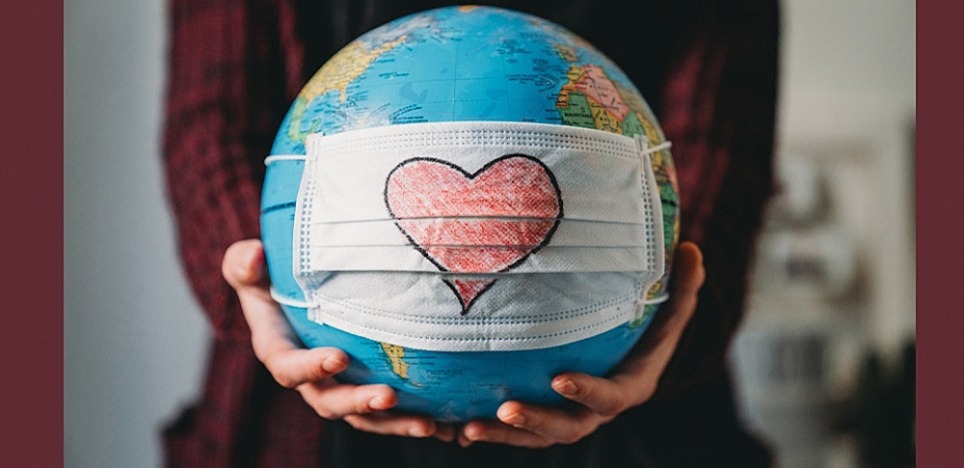The Alphabet of Spiritual Literacy is a list of 37 universal practices that are markers of the spiritual life. Spiritual literacy is the ability to recognize the presence of the sacred in our everyday experiences. These 37 practices both support this perspective and enable us to act upon it.
Since we identified these qualities of heart and mind in our book Spiritual Literacy and showed how they could be practiced in Spiritual Rx, we have been using them as a template for understanding our lives. We code every piece of content on SpiritualityandPractice.com to which of the 37 practices it illustrates. We've highlighted some of them in our Naming the Days features and used them to explain our film recommendations.
As COVID-19 has ravaged the world, we have found ourselves looking at how we can apply the alphabet practices to the pandemic. Some practices reframe what we are experiencing in light of the teachings of the spiritual traditions. Others suggest specific strategies we can use to cope.
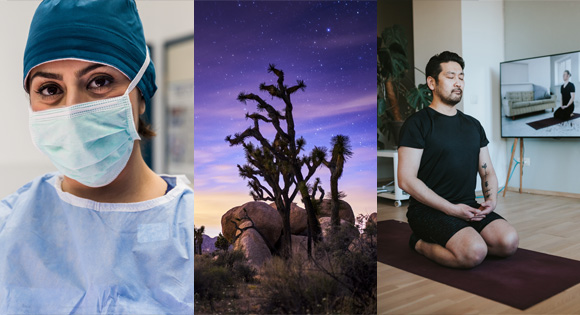
ATTENTION
"The quality of one's life depends on the quality of attention," said spiritual teacher Deepak Chopra. All of the world's wisdom traditions emphasize the importance of paying attention to what's happening in our lives; they suggest such practices as meditation, mindfulness, and contemplation to help us develop that capacity. Attention practice is important in pandemic times because the extra stress and out-of-the-ordinary work and home situations are distracting and depleting. It helps to do just one thing at a time. When we do, we are better able to assess the challenges we must deal with, and we are more likely to notice the blessings around and within us.
BEAUTY
After years of brainwashing by corporations promoting consumerism, many of us are rejecting the philosophy that more is better. The alternative, according to Jose Hobday, a Native American elder and Franciscan sister, is to choose spare rather than cluttered and generous rather than possessive. Hobday endorses the spiritual practice of beauty in simple living — "moving through life rather lightly; delighting in the plain and the subtle. . . . It is about living and giving with no strings attached." During the pandemic, many of us have found this kind of beauty as we have stayed at home. We've learned that a home is beautiful not only in its external appearances but for the moral beauties (modesty, humility, selfless love) of its inhabitants.
BEING PRESENT
"Begin doing what you want to do now. . . . We have only this moment, sparkling like a star in our hand and melting like a snowflake," advised Sir Francis Bacon. The pandemic has sent many people back to the past or into the future, longing for the way it was, perhaps regretting what we did before, or worrying about the future that we cannot control. But the spiritual practice of being present enables us to enroll in the University of the Present Moment where we can major in the art of self-witnessing, free intuitive writing, or hobbies such as singing and gardening. Here's an example of how the haiku artist Issa tapped into a single sweet moment of time:
"Summer night —
even the stars
are whispering to each other."
COMPASSION
Buddhist teacher Jack Kornfield calls the spiritual practice of compassion "the quivering of the pure heart — when we have allowed ourselves to be touched by the pain of life." The pandemic has challenged our capacity for compassion and helped us to expand its embrace to those sick with COVID-19 at home and in hospitals, those who are afraid because they have tested positive, those who have lost their jobs and run out of money, elders who are feeling lonely and abandoned, health care and essential workers who are exhausted and nervous about the risks their jobs entail, those who have died alone or away from home, and all the families and friends who have lost loved ones to the virus.

CONNECTIONS
Those who see that we are kith and kin of stones, bears, salmon, and galaxies are practitioners of connections. We recognize that all of life is interconnected, and everyone and everything is not only our neighbor, it is part of ourselves. Even a deadly virus cannot be seen as the "other." Think of what we know about COVID-19 — it's a type of virus common in the animal world that jumped to humans and now through droplets carried through the air and on surfaces is spreading to other humans and animals. This transmission is a form of connection.
DEVOTION
A poll conducted by the Pew Research Center shows that the pandemic is having a significant impact on spiritual habits by bringing more people to the practice of prayer. Sri Ramakrishna once said that he eats all types of food with an incredible mix of flavors. Why not approach our devotional life with the same enthusiasm for variety? We can say morning and evening prayers, recite grace before meals, embody prayers in dances or sing them in chants, say mantras and gathas, collect Milagros and other sacred symbols, meditate on icons, use prayer beads or prayer flags — and this list barely scratches the surface of formal and informal devotional practices and rituals. Those who have spent time studying the impact of COVID believe that resilience will be of great help as we face the continuing storms brought with this plague. How do we fortify resilience? By robust, disciplined, and multi-dimensional devotional practices.
ENTHUSIASM
Enthusiasm ranks high among the human qualities people affirm. By definition, it means having God within or being one with the energy of God. Enthusiasm is a wellspring that releases creativity and personal renewal. Think about enthusiastic people you know and you will probably talk about their joy, high spirits, and optimism. All of these qualities are needed by people dealing with the stress and depression accompanying COVID. Remember, like COVID, enthusiasm is very contagious.
FAITH
The spiritual practice of faith is reflected in the time and attention we give to our relationship with God — a rewarding and constantly expanding partnership that is based on trust. We can have confidence in the relationship's viability, even when we are facing doubts, paradoxes, and mysteries we cannot comprehend. This has both particular and general applications. For example, some 40 - 70 million people in the U.S. suffer from sleep disorders; the pandemic has resulted in a spike in cases. The spiritual practice of faith carries us through since it encourages both trust and surrendering our concerns and egos to God; sleeping, then, becomes a sacred ritual. On another level, many are describing their pandemic experiences as a dark night of the soul. But difficulties are known to be catalysts to faith. They show us why we need a relationship with the Divine, or as has been colorfully stated, they push us into the lap of God.
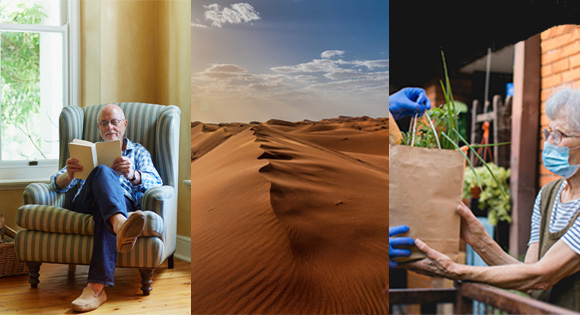
FORGIVENESS
"Life is an adventure in forgiveness," writer and editor Norman Cousins once wrote. But retaliation and revenge remain strong tendencies among us. We saw positive examples of choosing forgiveness when an Amish community forgave the shooter who killed five and wounded other children in their school in 2007 and when South Africa's Truth and Reconciliation Commission gave those who had committed crimes during apartheid an opportunity to confess what they had done in the presence of their victims' family members and ask for forgiveness. As the pandemic takes more and more lives, many of us will be tempted to play the blame game. Who's at fault? What more could have been done to stop it? How can we punish them for the loss of so many family members and friends? Forgiveness is an important spiritual practice at the end of life in order for people to die in peace. It is also an important practice for a community and a country reacting to great suffering and loss.
GRACE
God is always moving in our lives. God, I know you are here with me. I am accepted by God. Love abounds. These are a few of the phrases that recognize the bounties of grace showered upon us every day. Our part in this is to notice these gifts as they come to us. One good way to do this is to engage in life review, looking for times in your past when presents and presence came to you without your effort. You will find good illustrations of this when you read spiritual memoirs. These books show us how others have faced truths about themselves and the world and have endured pain and suffering. They are good spiritual resources during the pandemic.
GRATITUDE
All over the world people are struggling with social isolation and a lack of outside stimulation. We can't visit with friends or travel; we can't go to an art museum or a movie theater. But there is another side to this. The pandemic is giving us a chance to expand our practice of gratitude. We are noticing little things that we might have ignored before around our homes. We are discovering how grateful we are to many service providers — health care workers, delivery people, first responders, grocery store clerks, teachers, and others. The pandemic has also encouraged us to find unusual ways to take our places in the "barn raising lineage" of people who work together when outside resources are not available. This is a time to make longer gratitude lists.
HOPE
Carlo Carretto spent years as a hermit in the Sahara desert. Asked what he heard God saying to him, he replied: "God is telling us: learn to wait — wait — wait for your God, wait for love, be patient with everything. Everything that is worthwhile must be waited for!" It is that kind of patience that helps us sustain our hope. We do not know how long the hardships and sufferings brought on by COVID-19 will last. It's tempting to give in to gloom and doom. But with patience, as well as courage and persistence which also help us sustain hope, we know we can get through this. This is a good time to incorporate affirmations into your spiritual practices.

HOSPITALITY
We are engaging in the spiritual practice of hospitality when we welcome guests and even strangers into our lives with graciousness. Sometimes to do this, we have to cross boundaries and dismantle barriers between us and people who are different from us. It would seem that during the pandemic, opportunities to offer hospitality are limited; many of us simply cannot have people visiting in our homes. But Zoom and other digital communication platforms have made it possible for us to be with others in new ways. People are attending worship services in distant cities. They are going to virtual lectures or attending Zoom workshops where they participate in small breakout groups with strangers. And even established communities are discovering that geographical distances no longer limit their hospitality. In one Sufi order, dervishes used to get together annually for a national retreat; now they are meeting twice a month on Zoom with people from all over the world.
IMAGINATION
The spiritual practice of imagination drives our creativity, our love of stories and myths, and our appreciation of the natural world and the animal kingdoms. Ways to practice imagination include storytelling, film, art, music, dance, drama, art, writing, poetry, dreamwork, photography, and much more. During the pandemic, imagination gives us ways to reframe what is happening. Keep a journal, pay attention to the images that come to you via dreams, and reread stories that have touched you in the past to see if they speak to what you are feeling today.
JOY
Joy is the pure and simple delight in being alive. It is our elated response to feelings of happiness, experiences of pleasure, and awareness of abundance. One of the most delightful ways to invite this fulfilling and enchanting spiritual practice into your life is by staging celebrations. Large celebratory gatherings are discouraged by CDC and state guidelines because of their potential to spread the COVID-19 virus. But we can make up our own. That's what the little girl does in Bryd Baylor's children's book I'm in Charge of Celebrations. Out in the desert by herself, she celebrates Dust Devil Day, Rainbow Celebration Day, Green Cloud Day, Coyote Day, and The Time of Falling Stars. What in your environment can you celebrate today? You can also engage in the Buddhist practice of Sympathetic Joy where you celebrate the happiness of another — such as someone recovering from the virus.
JUSTICE
All of the world's religions and spiritual traditions see doing justice as a central imperative. It means, among other things, working to support the equality and dignity of all. Unfortunately, the pandemic has exacerbated inequalities in American society. Poor people and people of color have been disproportionately affected by the virus, revealing health issues in their communities and the lack of support services for them. In prisons and detention centers for immigrants and asylum-seekers, the virus has spread unchecked due to lack of testing and packed housing. The virus is exposing systemic injustices; our response needs to include systemic solutions.

KINDNESS
The spiritual practice of kindness, although often comprised of little, humble, and unheralded acts, is one which has a wide impact on both those who incarnate it and those who receive it. We've seem innumerable instances of kindness during the pandemic: young people delivering groceries to seniors, groups making and distributing masks, doctors and nurses flying in to supplement hospital staffs in virus epicenters, people running errands for vulnerable neighbors, front-line workers sanitizing work spaces, and many more efforts to help those in need. Perhaps one of the best examples of community kindness was when thousands of New York City residents went to their windows and balconies or stopped on the street every night at 7 pm to clap and cheer for health care workers.
LISTENING
Listening is a wonderful spiritual practice that plugs us into the world in so many ways. In an inventive phrase W. A. Mathieu celebrates the Creator's creativity in "making an altar out of our ears." New routines during the pandemic have us listening to more and different things than before. Instead of office chatter, at home we hear the sounds of neighborhood animals and perhaps our neighbors. Families and housemates find themselves listening to each other's concerns over meals. Many have more time for music or movies. How we connect with the world through listening has shifted, in many cases for the better.
LOVE
Relationships are the essential connections of our lives: family, intimate relationships, marriage, friends, and community. They are the central source of meaning in our days, and they are where we exercise our values and express our visions. If there is one arena that has been most affected by the illness, isolation, and anxiety of the pandemic, it is our relationships. Many of us long to visit with friends and family, recognizing that texts, calls, and virtual gatherings are not a substitute for face-to-face conversations and physical hugs. And perhaps the most dreadful consequence of the virus is that people who have spent much of their lives in the beauty, intimacy, and warmth of love end up dying alone in a hospital without any loved ones beside them.
MEANING
The pandemic has brought with it a long train of ideas, images, symbols, metaphors, and patterns. We have become inveterate meaning makers as this complex and deadly pandemic has spread around the world. Already there are more written and visual records of this tragedy than any other happening in the 21st century. What does it mean? What is the "big picture" here? Is this just the beginning of a series of pandemics? What are we missing about the implications of worldwide illness? What do we need to know now? Spirituality is often defined as the search for meaning and purpose. Spirituality during the pandemic is a search for understanding and a rededication to personal and community purpose.

NURTURING
In the pre-COVID-19 world, when asked how we were doing, we would usually say "busy." Now thanks to the restructuring of our time, we have more time for self-care. All of us, female and male, single or married, old or young can practice nurturing through exercise, yoga, art, music, gardening, and other activities. Many of us have more time to read and study. We are also learning that taking care of ourselves bolsters our capacities to serve others. Early in the pandemic, we often heard the phrase that this "time out of ordinary time" was an enforced "sabbath." Hopefully, we are learning the value of sabbath time to take care of our souls.
OPENNESS
Lao Tzu in the Tao Te Ching hurrahs the spiritual practice of openness as going with the flow of life. It also means being receptive to new habits and being willing to go into the dark in search of new possibilities. Sound familiar? In pandemic times, we are all called to open our minds and our hearts. Jason Shulman could have been talking about our pandemic era when he wrote, "When we have an openhearted attitude toward ourselves, we work with everything that comes — from insight to resistance, from boredom to enthusiasm, from tears to laughter." Openness is increased by empathy, something more of us are experiencing as we relate to others in similar situations as our own.
PEACE
Peace is an amphibian spiritual practice: it is an inner state of calm and it is also an outer project of cooperation in the world. Both aspects of peace are needed during a global pandemic. We are learning that the so-called negative emotions of anger, anxiety, and despair need to be balanced by feelings of peace, contentment, and happiness if we are to get through these uncertain times. At the same time, we are benefiting from the information distributed by global organizations like the World Health Organization and the experiences of people in the field like Doctors Without Borders. When countries co-exist in a state of peace, we can be assured that scientific discoveries of treatments and vaccines will be available to all countries. Thanks to the pandemic, we no longer take this reality for granted.
PLAY
All spiritual traditions make a place for play, humor, and laughter during, not despite, times of trouble. Through play we build up our tolerance for life's paradoxes and absurdities. We develop an immune response to despair. It's not surprising, then, that people are finding ways to play during shut-downs. Puzzles, board games, video games, and other entertainments take our minds off our troubles. One couple drew up a list of their favorite comedy films and distributed it to friends as medicine for the soul.
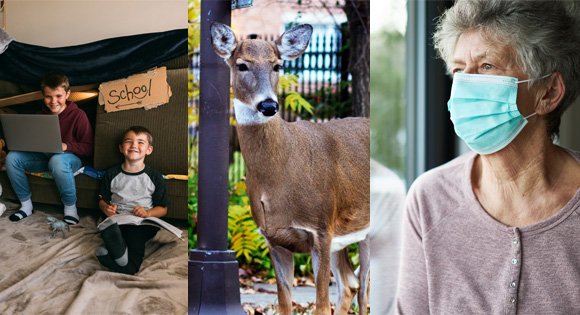
QUESTING
The word question is derived from the Latin quaerere (to seek) which has the same root as the word quest. This sounds right. Questions are primary motivators for those who take spiritual journeys. Questions help spiritual adventurers stretch their bodies, minds, and souls. Those of us trying to comprehend the virus and its implications for public life (closed businesses and schools, cancelled gatherings, restrictions on travel) have plenty of questions such as: How much longer is this plague going to last? Why are our leaders, scientists, and researchers having such a hard time coming up with a remedy? In what ways will this pandemic change our way of life and our core values?
REVERENCE
In The Book of Rites Confucius says: "Always and in everything let there be reverence." For him radical respect is the central building block of a better society. He speaks for those in the East, and Albert Schweitzer speaks for those in the West when he spells out his ethical stance as reverence for life. Where is reverence for life showing up in the pandemic? Certainly in the efforts of health care workers and scientists. But we are also seeing an impact on animals. Traffic has declined as much as 70% in some areas due to lockdowns, and the result has been that fewer animals are being killed on the roads. A National Geographic report projected that if traffic remains at 50% less rate for a year, some 500 million vertebrates will not be killed on roads and highways.
SHADOW
The spiritual practice of shadow encourages us to make peace with those parts of ourselves that we find despicable, unworthy, and embarrassing — our anger, jealousy, pride, selfishness, violence, and other "evil deeds." By doing shadow work, we learn to embrace our full humanity. It is an important practice for individuals tempted to project their own traits upon others and for societies that avoid taking any responsibility when bad things happen. The pandemic gives us a painful and glaring example of a nation in denial and prone to blame others for its difficulties: the Chinese, the governors, the federal government. The pandemic is a complex situation, and it is bringing out our personal and societal shadow.
SILENCE
Researchers have noted that, due to the shutdowns of activities during the pandemic, a "wave of silence" is spreading around the world — starting in China in late January and moving on to Italy and beyond in March and April 2020. Changes in the levels of human-generated noise affect the effectiveness of such things as seismic sensors to detect earthquakes. But what does more silence mean in spiritual circles? The act of being silent has been an essential dimension of spiritual and mystical experiences for millennia. Are you and the people you know embracing the quieter environment around you, or are you desperately trying to fill it up with noise from your devices, your tools, and your toys? A more silent world makes it easier for you to take an inner journey of the heart.

TEACHERS
All of us take for granted the teachers, sages, masters, elders, crones rebbes, gurus, sheiks, ministers, priests, nuns, and others who have through stories, parables, koans, sermons, lectures, and sacred texts guided us on our spiritual paths. The spiritual practice of teachers acknowledges even more teachers. As Rabbi David Cooper put it: "In the end, everyone is our teacher, on one level or another . . . Every experience is a challenge; a teaching is always hidden in it." This means that COVID-19 is our teacher. Those who have recognized this are using pandemic time for journaling and creative expression. Rather than focusing on events and COVID news, they are exploring what life lessons this experience holds for them.
TRANSFORMATION
Some of the most popular stories of all time — from fairy tales to modern movies — are about the spiritual practice of transformation. We learn about characters or people who are renewed, often by letting go of burdensome behaviors, and are set on a new path. In addition to the daily dose of depressing reports of COVID illnesses and deaths, we are hearing stories of courageous people who in the midst of the crisis have been able to find connection and sacred meaning. Perhaps this was nowhere more evident than in the anti-racism demonstrations by people of all ages and races after the extrajudicial death of George Floyd by police in Minnesota. People who had never before joined a Black Lives Matter march gathered in massive protests all over the country.
UNITY
Physical isolation is one side effect of the coronavirus; people are staying at home and avoiding gatherings to slow the spread. Emotional and spiritual isolation are also rampant. One way of coping is to practice unity, beginning by remembering all that we have in common with others. People all over the world are going through the same things we are. By looking at photographs from newsletters and magazines in other parts of our country and elsewhere in the world (widely available on the Internet), we can identify an underlying unity of existence. This realization then leads us to want to give up our individualistic independence and commit to working for the common good. The best sign of unity these days is people wearing masks. For this simple act affirms that your health and safety is affected by my health and safety. We are all in this together.
VISION
What will be the "new normal" at the end of the COVID-19 crisis? Will it be similar to the way things were before the pandemic, or will we create a different way of life entirely? And what would that look like? These are the kinds of questions considered by visionaries throughout history. Now they are showing up in conversations among families, friends, and colleagues, and from what we hear, most people want to see political, economic, and societal changes on the other side of the pandemic. This, then, is a good time to write a personal vision statement. Begin by stating the ideal life you want to manifest followed by the values and visions you want to bring to fruition in your life, work, health, relationships, emotions, feelings, and service. This forward pointing document also can include your hopes and dreams for future generations. The spiritual undertow here is a legacy document which can be read or used as an overview of your life.
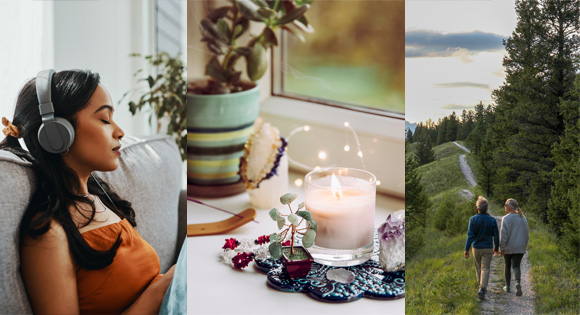
WONDER
Poet, essayist, and naturalist Diane Akerman is a multitalented teacher of the spiritual practice of wonder. "How sense-luscious the world is," she wrote in A Natural History of the Senses. "We need to return to the feeling textures of life." One of the most startling findings about Americans during the pandemic is the widespread complaint that both young and old are feeling bored, listless, and fed up with the tedium of being cooped up and unable to resume their normal socializing activities. Yet others have filled their time with experiences of wonder, which begins in the senses, comes alive in the imagination, and flourishes in awe. They have exercised their senses through cooking or nature walks, reading poetry, watching movies, visiting art galleries online, or listening to music.
X - THE MYSTERY
The letter "X" is often used to symbolize the unknown. The world is drenched with mystery and no matter how hard we try, we can't understand or explain it all. The coronavirus has knocked down our rational attempts to put it in its place or define it as if it were just another object in the universe. Some of us stay glued to our television sets or computers for the latest depressing news of the virus while we wait for a vaccine or a cure to be discovered. Perhaps instead we should embrace the spiritual practice of mystery. This entails having respect for what is not known through reason or logic. It recognizes the complexity of reality and admits that sometimes there are no answers. Because the pandemic is giving us practice in living with mystery, it is helping us not be afraid to say "I don't know" in other areas of our life as well.
YEARNING
Our yearning reveals the restlessness in our souls; it expresses our deep desire for something more than we have — and Something More, i.e. the Divine. The pandemic has certainly reminded us that we aren't satisfied with what is. There are many ways to honor our yearning — such as doing devotional practices or reading mystical writings that center on the desire for God. An everyday way is to make wishes. Have a wishes corner on your home altar where you place symbols of health and healing. Put up a wishing wall in your neighborhood where people can post notes about what they would like to see happen now and in the future. Sign petitions in support of what you yearn for. And vote.
YOU
The spiritual practice of you reminds us that we are a lot more and a lot less than we think we are. The pandemic does the same. We are discovering that we are stronger, more courageous, and more resilient than we ever knew we could be. We can identify with novelist Morris West's view: "The older I get, the more convinced I am that every human life is an evolutionary process during which the Creator offers to the creature an experience of divinity, an opportunity, great or small, to share in the ongoing art of creation." At the same time, the virus shows us our vulnerability, that we are not in control. Humility not hubris is the most appropriate response. As the days and months of the pandemic drone on, try this breath prayer using the words of actor Sidney Poitier:
Breathing in: May I be true to myself . . .
Breathing out: and useful to the journey.
ZEAL
This practice means being fully aroused to life — and it is key to getting through a pandemic. It means giving ourselves 100%. If we are eating, we just eat. If we are petting our cat, we focus on the animal and his response. When we participate in a Zoom call, we listen intently and speak carefully. When we give 100% of ourselves, the chaos, the madness, and the anxiety that are depleting our energy are pushed aside for the moment. Through the practice of Zeal, we get energy from both the common ground we share with others and the common good that we serve.
![]()
It has been said that our spiritual path is wherever we come alive. Think about what that means in pandemic times. We've identified many practices as we've gone through the Alphabet of Spiritual Literacy. We hope that many of them will help you come more fully alive in these times. For, as the mystic Howard Thurman put it:
"Don't ask yourself what the world needs. Ask yourself what makes you come alive, and go do that, because what the world needs is people who have come alive."
